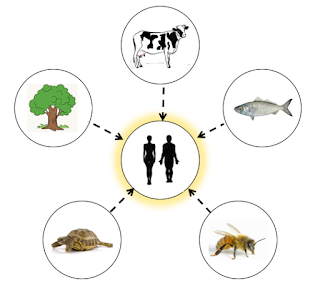Selection of quotations
This list of insightful quotations represent the main focus, interest and horizon of the Society for Interdisciplinary Ecolinguistic Research.
It is nearly impossible to gain an understanding of the interactions and organisation constituting the world of living nature without a semiotic terminology - and perhaps more fundamentally a semiotic way of thinking.
-Jesper Hoffmeyer.
The twentieth-century linguistic revolution is the recognition that language is not merely a device for communicating ideas about the world, but rather a tool for bringing the world into existence in the first place. Reality is not simply ‘experienced’ or ‘reflected’ in language, but instead is actually produced by language.
-Misia Landau.
We cannot evolve faster than our language. The edge of being is the edge of meaning, and somehow we have to push the edge of meaning. We have to extend it.
-Terence Mckenna
The twenty-first century's manifold crises are most fundamentally rooted in a crisis of language. The problem for us is that we fail to understand what language is all about, how it shapes our personalities, our mindsets and our collective practices. By failing to understand, we simply end up reinforcing all the maladaptive beliefs and narratives implicit in the cultural meaning system where we are born, sinking deeper into crisis, delusion and death.
-Rodrigo Cáceres
Thought can't go where the roads of language have not been built. You decide where you want to go and you build a linguistic path there. Our political dilemma and our cultural dilemma is a linguistic dilemma. We need to take hold of our language and build it consciously.
-Terence Mckenna
The metaphoric character of philosophy is not unique to philosophic thought. It is true of all abstract human thought [...]. Conceptual metaphor is what makes most abstract thought possible [...] it is one of the greatest of our intellectual gifts.
-George Lakoff & Mark Johnson.
Philosophical theories are largely the product of the hidden hand of the cognitive unconscious.
-George Lakoff & Mark Johnson.
What is the delight of life? What is the tragedy of life? What is the emancipation of life? [...] The happiness and joy that arise conditioned by life, that is the delight of life; that life is impermanent, difficult and changing, that is the tragedy of life; the removal and abandonment of grasping for life, that is the emancipation of life."
-Siddhartha Gautama.
The mind's deepest desire, even in its most elaborate operations, parallels man's unconscious feeling in the face of his universe: it is an insistence upon familiarity, an appetite for clarity.
-Albert Camus.
For Lacan, language is a gift as dangerous to humanity as the horse was to the Trojans: it offers itself to our use free of charge, but once we accept it, it colonizes us.
-Slavoj Zizek.
Any conceptual work in philosophy cannot be achieved without a previous analysis and comprehension of language.
A true teacher does not have anything to teach in the conventional sense of the word, does not have anything to give or add to you, such as new information, beliefs, or rules of conduct. The function of such a teacher is to help you see the implicit attitudes you are having towards those beliefs, values, rules and informations. At the same time, she or he will then show you that there are other possible attitudes you can adopt. Once you can see this, you will be free to evaluate if your current attitudes are adequate or inadequate for yourself, others and the world. Such a teacher can only show you the path to other possibilities, but you are the one who has to walk through it.
Not what is apparent, but what is said about what is apparent -and this is different from investigating what is apparent itself. For example, it appears to us that honey sweetens (we concede this inasmuch as we are sweetened in a perceptual way); but whether [...] it is actually sweet is something we investigate - and this is not what is apparent but something said about what is apparent"





Comments
Post a Comment